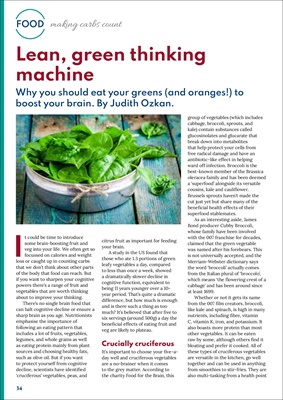
34
FOOD making carbs count
Lean, green thinking
machine
Why you should eat your greens (and oranges!) to
boost your brain. By Judith Ozkan.
It could be time to introduce
some brain-boosting fruit and
veg into your life. We often get so
focussed on calories and weight
loss or caught up in counting carbs
that we don't think about other parts
of the body that food can reach. But
if you want to sharpen your cognitive
powers there's a range of fruit and
vegetables that are worth thinking
about to improve your thinking.
There's no single brain food that
can halt cognitive decline or ensure a
sharp brain as you age. Nutritionists
emphasise the importance of
following an eating pattern that
includes a lot of fruits, vegetables,
legumes, and whole grains as well
as eating protein mainly from plant
sources and choosing healthy fats,
such as olive oil. But if you want
to protect yourself from cognitive
decline, scientists have identified
'cruciferous' vegetables, peas, and
citrus fruit as important for feeding
your brain.
A study in the US found that
those who ate 1.3 portions of green
leafy vegetables a day, compared
to less than once a week, showed
a dramatically slower decline in
cognitive function, equivalent to
being 11 years younger over a 10-
year period. That's quite a dramatic
difference, but how much is enough
and is there such a thing as too
much? It's believed that after five to
six servings (around 500g) a day the
beneficial effects of eating fruit and
veg are likely to plateau.
Crucially cruciferous
It's important to choose your five-aday
well and cruciferous vegetables
are a no-brainer when it comes
to the grey matter. According to
the charity Food for the Brain, this
group of vegetables (which includes
cabbage, broccoli, sprouts, and
kale) contain substances called
glucosinolates and glucarate that
break down into metabolites
that help protect your cells from
free radical damage and have an
antibiotic-like effect in helping
ward off infection. Broccoli is the
best-known member of the Brassica
oleracea family and has been deemed
a 'superfood' alongside its versatile
cousins, kale and cauliflower.
Brussels sprouts haven't made the
cut just yet but share many of the
beneficial health effects of their
superfood stablemates.
As an interesting aside, James
Bond producer Cubby Broccoli,
whose family have been involved
with the 007 franchise for decades,
claimed that the green vegetable
was named after his forebears. This
is not universally accepted, and the
Merriam-Webster dictionary says
the word 'broccoli' actually comes
from the Italian plural of 'broccolo',
which means 'the flowering crest of a
cabbage' and has been around since
at least 1699.
Whether or not it gets its name
from the 007 film creators, broccoli,
like kale and spinach, is high in many
nutrients, including fibre, vitamin
C, vitamin K, iron, and potassium. It
also boasts more protein than most
other vegetables. It can be eaten
raw by some, although others find it
bloating and prefer it cooked. All of
these types of cruciferous vegetables
are versatile in the kitchen, go well
together and can be used in anything
from smoothies to stir-fries. They are
also multi-tasking from a health point